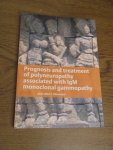Stel een vraag
Met het formulier hier onder kunt u contact op nemen met boekwinkel Boekenprinses.
Niermeijer, J.M.F. - Prognosis and treatment of polyneuropathy associated with IgM monoclonal gammopathy
De vraag gaat over de volgende titel:
| Afbeelding: |

|
|---|---|
| Schrijver: | Niermeijer, J.M.F. |
| Titel: | Prognosis and treatment of polyneuropathy associated with IgM monoclonal gammopathy |
| ISBN: | 9789090247304 |
| Uitgever: | Universiteit Utrecht proefschrift 13 november 2009 + stellingen isbn 9789090247304 |
| Bijzonderheid: | 160 ppm, paperback, in goede staat |
| Prijs: | € 8,00 |
| Meer info | Prognosis and treatment of polyneuropathy associated with IgM monoclonal gammopathy Introduction (Chapter 1) Polyneuropathy represents a clinical syndrome with sensory symptoms and muscle weakness in the lower legs with a gradual progression to the more proximal regions and the upper extremities. In about 10-20% no underlying cause is identified. At further analysis, a monoclonal gammopathy is found in 10% of these patients. Polyneuropathy associated with IgM monoclonal gammopathy of undetermined significance (IgM MGUS polyneuropathy) is an immune mediated polyneuropathy, with antibodies directed against myelin associated glycoprotein (MAG) in 50% of the patients. It runs in a highly variable but progressive course and disability warrants treatment, that aims at lowering the M protein and suppressing the immune system. The Outpatient Department for Neuromuscular diseases at the UMC Utrecht monitors one of the largest documented groups of patients in a single academic institution with IgM MGUS polyneuropathy, A prognostic model for disability (Chapter 2) 140 patients were followed in a prospective cohort study. A substantial part of patients develop disability up to a level that they need assistance with daily activities (Rankin scale 3). The presence of anti-MAG antibodies reduced and a higher age at onset and demyelination increased the risk for that level of disability. We developed a prognostic model for development of disability in IgM MGUS polyneuropathy. For practical application of the model, a risk table and a web-based risk calculator were designed. http://www.umcutrecht.nl/subsite/Prognosis-MGUS-Neuropathy A placebo-controlled trial with cyclophosphamide-prednisone (Chapter 3) The trial included 35 patients. There were no serious adverse events, the most common being nausea. The primary outcome measure, the Rivermead mobility index (RMI), and the Rankin scale were similar in both groups. However, muscle strength; sensory function, and 2 domains of the SF 36 quality of life scale changed more in the treated group. As the primary outcome was not better after treatment with cyclophosphamide and prednisone, this combined treatment can not be advised as a standard therapy for IgM MGUS polyneuropathy. A prospective open label trial with fludarabine (Chapter 4) There were no serious side effects. Improvement of disability (the modified Rankin scale) was present in 5/16 patients, who all had a demyelinating polyneuropathy and shorter disease duration. Hematological response in bone marrow occurred in 8/16 patients. A prospective open label trial with rituximab (Chapter 5) There were no serious adverse events. It induced improvement of the Overall Disability Sum Score (ODSS) in 2/17 patients, of muscle strength in 4/17 and of sensory function in 9/17 patients. Bone marrow investigations showed CD 20 B cell depletion in all patients. The response rates were comparable to those of combined intermittent cyclophosphamide with prednisone, fludarabine or rituximab schedules, but with fewer side effects. Correlation of electrophysiology with clinical severity and response to treatment (Chapter 6) Patients with IgM MGUS polyneuropathy and pronounced motor nerve conduction abnormalities were more likely to improve on immunotherapy than patients with less pronounced abnormalities. The neurophysiological assessment may support the clinical severity grading and optimize the selection of patients likely to benefit from treatment with immunotherapy. |
| Boek bekijken | |
Verzending van boeken vindt plaats na ontvangst van de betaling. Ophalen is mogelijk na afspraak.
Wij reageren altijd binnen 24 uur na uw bestelling. Heeft u binnen deze tijd geen reactie ontvangen, dan is onze mail waarschijnlijk in de spambox terecht gekomen.
We verzenden via DPD. De tarieven voor thuisbezorging bedragen € 4,15 voor brievenbuspost, € 6,00 voor pakketten tot 1 kg en € 6,25 voor pakketten van 1 kg tot 10 kg. Voor pakketten is het mogelijk om deze af te halen bij een DPD parcelshop, bij pakketten tot 1 kg bedragen de verzendkosten dan € 5,00 en bij pakketten van meer dan 1 kg bedragen de verzendkosten dan € 5,25. Boeken worden standaard naar het huisadres gezonden, wilt u liever afhalen bij een parcelshop, dan dit graag bij de bestelling aangeven. Meerdere boeken ineens kopen scheelt verzendkosten.
De verzendkosten naar België bedragen € 7,00 thuisbezorgd.
Verzendkosten naar andere landen zijn op aanvraag.
Retourneren is mogelijk binnen 14 dagen. Retourkosten zijn voor eigen rekening.
Wij reageren altijd binnen 24 uur na uw bestelling. Heeft u binnen deze tijd geen reactie ontvangen, dan is onze mail waarschijnlijk in de spambox terecht gekomen.
We verzenden via DPD. De tarieven voor thuisbezorging bedragen € 4,15 voor brievenbuspost, € 6,00 voor pakketten tot 1 kg en € 6,25 voor pakketten van 1 kg tot 10 kg. Voor pakketten is het mogelijk om deze af te halen bij een DPD parcelshop, bij pakketten tot 1 kg bedragen de verzendkosten dan € 5,00 en bij pakketten van meer dan 1 kg bedragen de verzendkosten dan € 5,25. Boeken worden standaard naar het huisadres gezonden, wilt u liever afhalen bij een parcelshop, dan dit graag bij de bestelling aangeven. Meerdere boeken ineens kopen scheelt verzendkosten.
De verzendkosten naar België bedragen € 7,00 thuisbezorgd.
Verzendkosten naar andere landen zijn op aanvraag.
Retourneren is mogelijk binnen 14 dagen. Retourkosten zijn voor eigen rekening.
De verkoper zal binnen 1 werkdag contact met u opnemen om de koop verder af te handelen.
